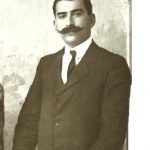 1879 – Luigj Gurakuqi was born, activist of the national cause, drafter and signer of the Declaration of Independence of Albania, poet, teacher, textologist, linguist, diplomat, deputy. He is one of the most prominent personalities of our national, educational and cultural movement at the end of the National Renaissance and the beginning of Independence, experiencing the most culminating events of the country in the first quarter of our century, most of which if not organized, was a direct participant. He attended primary and secondary school at the Saverian College in the technical-commercial order, from where he graduated in 1897. He completed his secondary education at the Arbëresh College of St. Miter Korona, where he had teacher De Rada, who inspired him for life; was the first Albanian student there. Gurakuqi recalls meeting him: Luigj Gurakuqi was one of the most active deputies in the Albanian parliament in the early 1920s. In this period, Albania had just emerged from the War and the mode of economic development was widely discussed. The options for Albania in this period were only two: that of taking a loan from abroad, and that of granting concessions for the use of natural resources. In this way, revenues could be secured to enable the country’s economic engine to start. Gurakuqi participated in the Revolutionary Committee that led to the June Movement, and was assigned to arm the Nikaj-Mërtur Kachaks. In the Noli government that emerged after the June Movement, he was appointed Minister of Finance. He attended the Geneva Conference alongside Noli in 1924.
1879 – Luigj Gurakuqi was born, activist of the national cause, drafter and signer of the Declaration of Independence of Albania, poet, teacher, textologist, linguist, diplomat, deputy. He is one of the most prominent personalities of our national, educational and cultural movement at the end of the National Renaissance and the beginning of Independence, experiencing the most culminating events of the country in the first quarter of our century, most of which if not organized, was a direct participant. He attended primary and secondary school at the Saverian College in the technical-commercial order, from where he graduated in 1897. He completed his secondary education at the Arbëresh College of St. Miter Korona, where he had teacher De Rada, who inspired him for life; was the first Albanian student there. Gurakuqi recalls meeting him: Luigj Gurakuqi was one of the most active deputies in the Albanian parliament in the early 1920s. In this period, Albania had just emerged from the War and the mode of economic development was widely discussed. The options for Albania in this period were only two: that of taking a loan from abroad, and that of granting concessions for the use of natural resources. In this way, revenues could be secured to enable the country’s economic engine to start. Gurakuqi participated in the Revolutionary Committee that led to the June Movement, and was assigned to arm the Nikaj-Mërtur Kachaks. In the Noli government that emerged after the June Movement, he was appointed Minister of Finance. He attended the Geneva Conference alongside Noli in 1924.
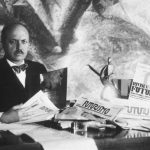 1909 – The publication of the Futurist Manifesto in the French magazine Le Figaro. This is a manifesto written by the Italian poet Filippo Tommaso Marinetti and published in 1909. Marinetti expresses an artistic philosophy called Futurism that was a rejection of the past and a celebration of speed, machinery, youth, and industry. He also advocated the modernization and cultural renewal of Italy.
1909 – The publication of the Futurist Manifesto in the French magazine Le Figaro. This is a manifesto written by the Italian poet Filippo Tommaso Marinetti and published in 1909. Marinetti expresses an artistic philosophy called Futurism that was a rejection of the past and a celebration of speed, machinery, youth, and industry. He also advocated the modernization and cultural renewal of Italy.
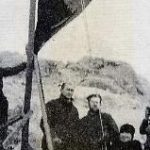 1935 – Caroline Mikkelsen becomes the first woman to break into Antarctica. On February 20, 1935, the expedition landed somewhere on the Antarctic continental shelf. Mikkelsen left the ship and took part in raising the Norwegian flag and building a commemorative plaque. Today, the place where she landed on the icy continent (which is Norwegian territory) honorably bears her name.
1935 – Caroline Mikkelsen becomes the first woman to break into Antarctica. On February 20, 1935, the expedition landed somewhere on the Antarctic continental shelf. Mikkelsen left the ship and took part in raising the Norwegian flag and building a commemorative plaque. Today, the place where she landed on the icy continent (which is Norwegian territory) honorably bears her name.
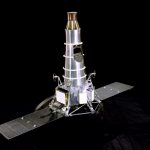 1965 – Ranger 8 crashes on the moon after a successful mission of photographing possible landing sites for astronauts of the Apollo program. Ranger 8 was a lunar probe on the Ranger program, a robotic spacecraft series launched by NASA in the early-mid 1960s to obtain the first near-surface images of the moon. This space probe would be part of the Apollo program.
1965 – Ranger 8 crashes on the moon after a successful mission of photographing possible landing sites for astronauts of the Apollo program. Ranger 8 was a lunar probe on the Ranger program, a robotic spacecraft series launched by NASA in the early-mid 1960s to obtain the first near-surface images of the moon. This space probe would be part of the Apollo program.
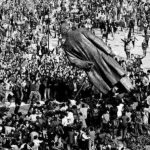 1991 – In the Albanian capital Tirana, the giant statue of Communist dictator Enver Hoxha is overthrown by mobs of angry students and protesters. Thousands of people would take part in the act, which would end in clashes with the police. The overthrow of the statue of the communist dictator would de facto close the 47-year chapter of Albania’s communist dictatorship.
1991 – In the Albanian capital Tirana, the giant statue of Communist dictator Enver Hoxha is overthrown by mobs of angry students and protesters. Thousands of people would take part in the act, which would end in clashes with the police. The overthrow of the statue of the communist dictator would de facto close the 47-year chapter of Albania’s communist dictatorship.
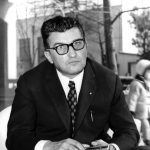 1993 – Ferrucio Lamborghini dies at age 76 in Perugia. Lamborghini was an Italian industrialist. In 1963, he created Lamborghini Automobile, a manufacturer of high-end sports cars in Sant’Agata Bolognese. In 1959, he opened an oil heating plant, Lamborghini Bruciatori, which later went into the business of manufacturing air conditioning equipment.
1993 – Ferrucio Lamborghini dies at age 76 in Perugia. Lamborghini was an Italian industrialist. In 1963, he created Lamborghini Automobile, a manufacturer of high-end sports cars in Sant’Agata Bolognese. In 1959, he opened an oil heating plant, Lamborghini Bruciatori, which later went into the business of manufacturing air conditioning equipment.
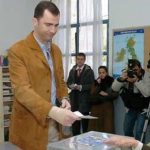 2005 – Spain becomes the first country to vote in a referendum on the ratification of the proposed European Union Constitution, passing it by a significant margin but with low turnout. The consultative referendum on ratifying the proposed Constitution for the European Union was approved with 81 percent of the valid vote, though turnout was only 41 percent.
2005 – Spain becomes the first country to vote in a referendum on the ratification of the proposed European Union Constitution, passing it by a significant margin but with low turnout. The consultative referendum on ratifying the proposed Constitution for the European Union was approved with 81 percent of the valid vote, though turnout was only 41 percent.







